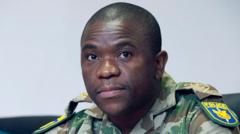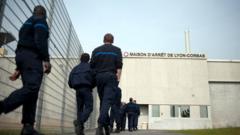**Nhlanhla Mkhwanazi, a notable police general, has stirred controversy by publicly accusing South Africa’s Police Minister Senzo Mchunu of connections with organized crime and shutting down vital investigations, rallying public support amid growing dissatisfaction with police efficacy.**
**Explosive Allegations Rock South African Police As Top Officer Accuses Minister of Corruption**

**Explosive Allegations Rock South African Police As Top Officer Accuses Minister of Corruption**
**General Nhlanhla Mkhwanazi’s astounding claims of criminal links among high-ranking officials reverberate across South Africa, challenging political authority.**
General Nhlanhla Mkhwanazi, serving as the police chief of KwaZulu-Natal, has ignited a political storm in South Africa with serious allegations against Police Minister Senzo Mchunu. Donned in military-style attire and flanked by armed officers, Mkhwanazi accused Mchunu of ties to organized crime and criticized him for disbanding an elite unit investigating political murders after it unearthed connections to a drug cartel within various sectors, including business and judiciary.
“We are on combat mode, I am taking on the criminals directly,” Mkhwanazi declared during a nationally televised press conference earlier this month, resonating with many South Africans increasingly alarmed by organized crime's deep-rooted influence. Dr. Johan Burger, a leading crime expert, described the organized crime situation as "serious," harkening back to notorious cases like that of former police chief Jackie Selebi, who was imprisoned for corruption.
This unprecedented public denunciation of a cabinet member by a police officer has elicited varied responses. Minister Mchunu promptly dismissed Mkhwanazi's allegations as "wild and baseless," however, the public overwhelmingly rallied behind Mkhwanazi, even trending on social media platforms as a symbol of resistance against perceived governmental corruption.
Mkhwanazi's reputation stems from his historic decision to suspend controversial crime intelligence boss Richard Mdluli in 2011, seen as an act of integrity amid a politically charged environment. His courage in addressing corruption not only earned him public support but also led to his temporary removal from office as political pressures mounted. Following his appointment back into the police force in 2018 with the mandate to combat rampant crime fueled by political strife, he has emerged once more as a figure of valiance.
Despite the spotlight on Mkhwanazi, he has faced scrutiny himself, previously investigated for an alleged interference in a criminal inquiry involving a senior prisons official, from which he was cleared. Analysts suggest that public desire for a 'hero' in law enforcement may outweigh concerns over policing methods under Mkhwanazi’s leadership, fostering a ‘cop's cop’ narrative.
As Mchunu prepares to step away from his position, Firoz Cachalia, a law professor with a legacy tied to anti-apartheid activism, will assume the role of acting police minister. In a recent interview, Cachalia acknowledged the gravity of Mkhwanazi's claims, labelling them "highly unusual" but potentially justified if substantiated, leading the country to watch closely for developments in this unfolding narrative.
General Mkhwanazi's bold allegations have placed him at a critical juncture. Should he prove Mchunu's alleged misdeeds, he secures his legacy as a staunch guardian of justice; failure, however, may irreparably tarnish his standing. For now, Mkhwanazi remains a beacon of hope in a struggling police force, amid public trust at a historic low, reaching merely 22%, according to recent surveys. The activists and citizens who stand behind him mirror a broader demand for accountability within South Africa's political landscape.



















